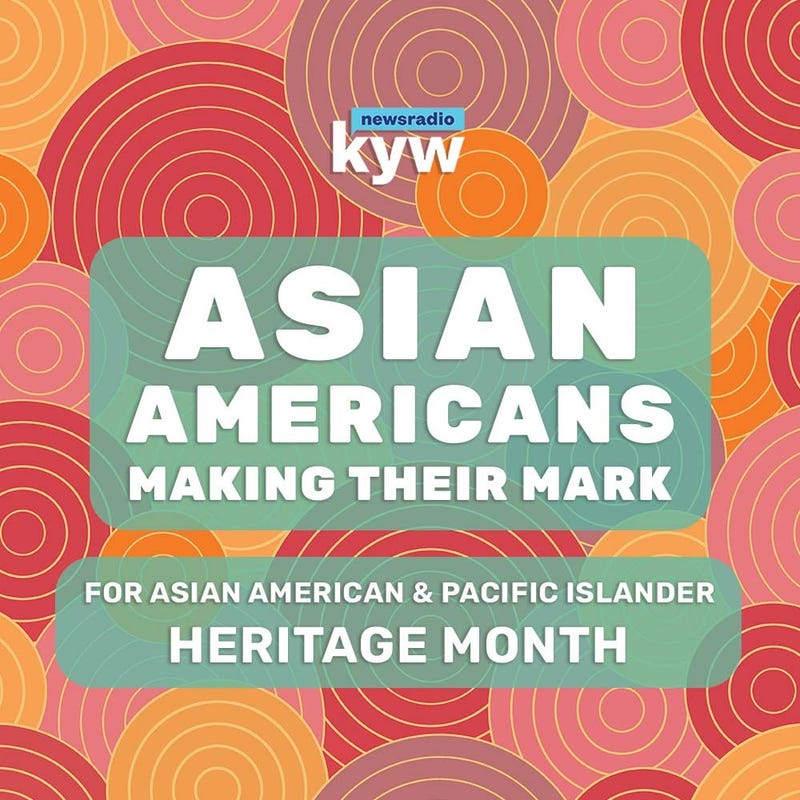
PHILADELPHIA (KYW Newsradio) — Throughout Asian American and Pacific Islander Heritage Month, KYW Newsradio is celebrating the contributions of these diverse and essential communities with an audio series called “Asian Americans Making Their Mark.”
Asian Americans are a diverse group comprising more than 30 ethnicities and nationalities and are the fastest growing racial group in the United States. This series, led by KYW Newsradio's Denise Nakano, recognizes their history, culture and achievements in the Philadelphia region at a time when AAPI communities are seeing a rise in anti-Asian speech and activity across the country.
Join KYW Newsradio as we celebrate the journeys, cultures and unique life experiences of people from Philadelphia’s AAPI communities. Hear a new story every Tuesday and Thursday through the month of May.

Dr. Jason K.C. Tong — general surgery resident, Hospital of the University of Pennsylvania
A son's love for his mother motivates the work of Dr. Jason K.C. Tong, 31.
For as long as he could remember, Dr. Tong wanted to tackle racial disparities in health care because of the struggles he saw his mother face as a new immigrant to the United States.
"I always bring it back to my mother, who was a huge source of inspiration … what motivates everything that I do,” said Dr. Tong.
“I just think back to all the times that she struggled in a system where she felt like she couldn't get any help, and I just want to make sure that just doesn't happen anymore.”
Dr. Tong's research is focused on the idea of giving voice to the unheard.
“I think that we have the resources. We have all this technology, I think that we can do great things," said Tong, "as long as we listen to people and meet them on their level."
He understands that communities of color often feel ignored or disenfranchised, so he’s taking a look at research and the way that data is collected, including the use of online reviews such as Yelp.
Dr. Tong notes that information derived from online reviews can provide an additional window into patient care and what needs to be improved.
He hopes to create a system of gaining patient reviews beyond relying on hospital feedback to use as a resource for dismantling systemic racism in patient care.
Dr. Tong is optimistic that fair and equitable treatment can be achieved for patients, no matter their background.
“I would hope that people will just continue to speak up and tell us what's wrong,” said Dr. Tong. “Believe it or not, someone is listening, I'm listening, and we're trying to do better.”

Sarun Chan — Executive Director of the Cambodian Association of Greater Philadelphia
Sarun Chan from South Philadelphia is making a name for himself as a leader and influencer, serving as the executive director of the Cambodian Association of Greater Philadelphia. The path that led the 36-year-old to this point has been a journey of understanding and acceptance.
“Understanding that your identity is a journey of self-discovery, and that’s a journey worth taking,” he said.
Chan is proud of his Cambodian heritage and Southeast Asian culture. He also takes pride in his identity as a gay man. Pride Month comes in June, right after Asian American and Pacific Islander Heritage Month this May.
“My education, and also professionally, has been a specific intersectional identity that has always been in the forefront of my mind, just because the experiences have been unique on their own,” said Chan.
Having found his own voice allows him to speak out for others as an advocate for the Cambodian, refugee and immigrant communities. His South Philly roots also help inform and enlighten his work.
“I have so much Cambodian pride, I want to make sure I highlight that I’m also a gay male. So I always want to make sure people understand that that’s part of my identity and decision-making as well. I’m from inner-city Philadelphia, from South Philadelphia. It’s really important that I don’t lose my roots, and also help shape young minds in our community.”
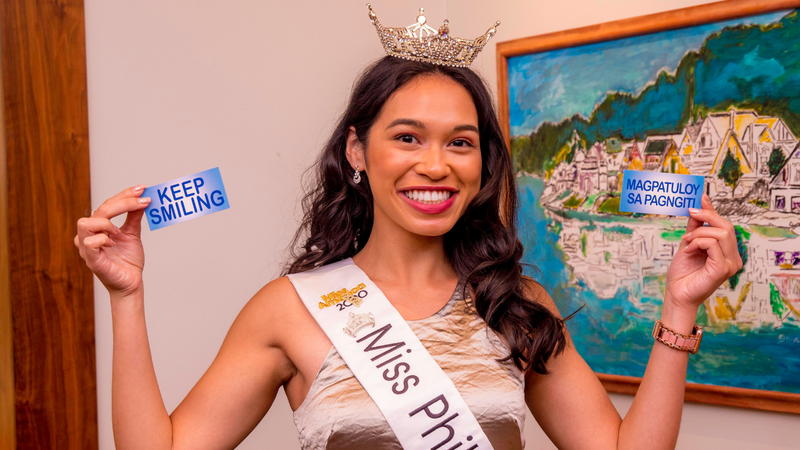
Elaine Ficarra — Miss Independence
Elaine Ficarra is bringing diversity to the pageant scene: She’s a former Miss Philadelphia who currently holds the title of Miss Independence.
“I’m proud to say that I was the first Filipino American Miss Philadelphia and that I get to be that diversity in the Miss America organization,” she said.
She serves as an ambassador for the city. The 21-year-old singer is using her role to bring attention to suicide prevention, a cause that’s near and dear to her heart after a close friend took his own life.
“I’m hoping that these appearances, speaking and singing empowering songs and doing whatever I can to be someone that can initiate the conversation,” she said, “more people can talk about their mental health struggles.”
Ficarra has five singles, one of which is called “Start with Believing.” “It really does all start with you, with having that perseverance and having that mindset,” she said.
Ficarra grew up near Downingtown, Chester County. Not only is she an aspiring singer, entertainer and pageant competitor, but she is also studying to become a doctor. She is currently a pre-med student at Drexel University.
So, what’s next for the former 2021 Miss Philadelphia? In addition to her other pursuits, she plans on competing for Miss Pennsylvania in June.
The love and support from her family and community motivate her and remind her of her favorite quote by Nat King Cole: “The greatest thing you’ll ever learn is just to love and be loved in return.”
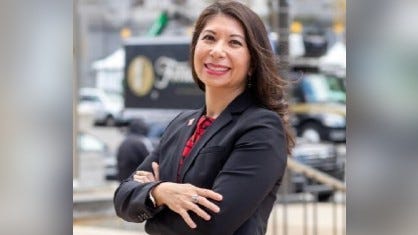
Romana Lee-Akiyama — Director of the Mayor's Office of Public Engagement
"In order to heal, we need to feel."
Romana Lee-Akiyama lives by those words.
As director of the Mayor’s Office of Public Engagement, she is making her mark as an Asian American by facilitating programs that bring the city and marginalized communities together. Though, she says, Asian Americans are still underrepresented in city government.
“We are maybe around 4% of the overall workforce. And once you get higher up in leadership, there are very few of us,” she said.
Lee-Akiyama says she is proud of her heritage as a mixed-race Asian American and as the daughter of an immigrant, saying her late father’s resilience drives her to fight for the wellbeing of all city residents.
“His story and his strength is what has given me passion to give back to community and to be an advocate for those who are new to this country, who are learning English, who are struggling to put food on the table for their families,” she said. “They're trying to figure out what is the best way to make a life here in the U.S.”

She has opened up dialogue with the Black and Gold series, an initiative focused on promoting difficult conversations and building mutual understanding between Black and Asian communities. The need to build those bridges was thrust into the public consciousness last summer, when a group of Black teenage girls were caught on video attacking some Asian American teenagers.
Lee-Akiyama says feelings can be very scary, especially when they overwhelm or trigger memories of the past. “For all of our city residents now who are hurting in one way or another, lean into their feelings that you might have feeling in your body,” she said. “Recognize how it exists in your body. And just be present with yourself.”
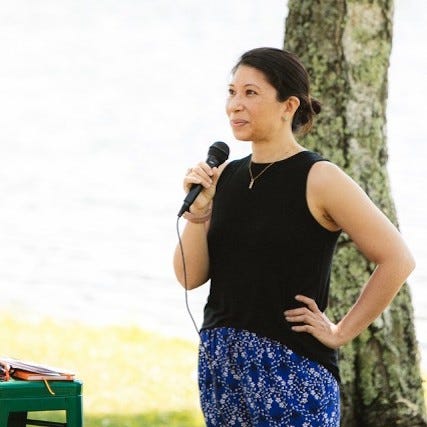
Akiyama says the city’s diverse population has exploded in recent years. “The Asian American community, in particular, has grown by 39%,” she said. “In the last 10 years, the Latino community has grown by 36%. And these two communities combined have been responsible for more than half the growth in the city in the last 10 years.”
That growth drives her to push the envelope.
Soon, she will be overseeing another program as part of the Black and Gold series — a leadership boot camp that will foster relationships among 50 community members. Lee-Akiyama says she believes the boot camp is a first for city governments in the U.S.
“It’s relationship building, and it is addressing some of the historic tensions that have existed, but also lifting up where there has been beauty and there has been cooperation and support,” she said.
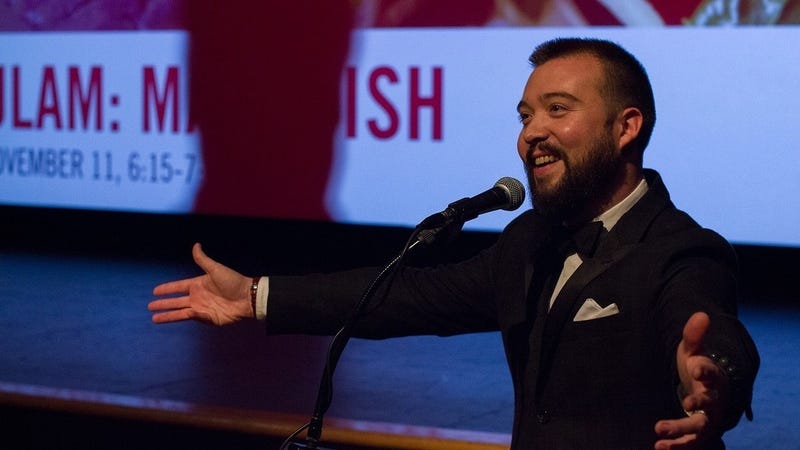
Rob Buscher — Educator, activist and arts administrator
"Be the nail that stands out."
That’s something from a Japanese proverb that educator, activist and arts administrator Rob Buscher likes to say: The nail that sticks out gets hammered down.
But Buscher, of bi-racial Japanese American heritage, says he wants people to defy that idea — to be the nail that stands out.
“That's the biggest message that I would send, especially to Asian Americans,” Buscher said, “as we've been underrepresented for so long in media and popular culture. We need to get better at telling our own stories. And we need to make sure that this reaches every aspect of the public.”
He encourages people of all backgrounds to become empowered to tell their own stories.
“If you're not the one who's narrating, someone else is going to tell it for you,” Buscher said. “And they won't be able to do it with the nuance that it deserves.”
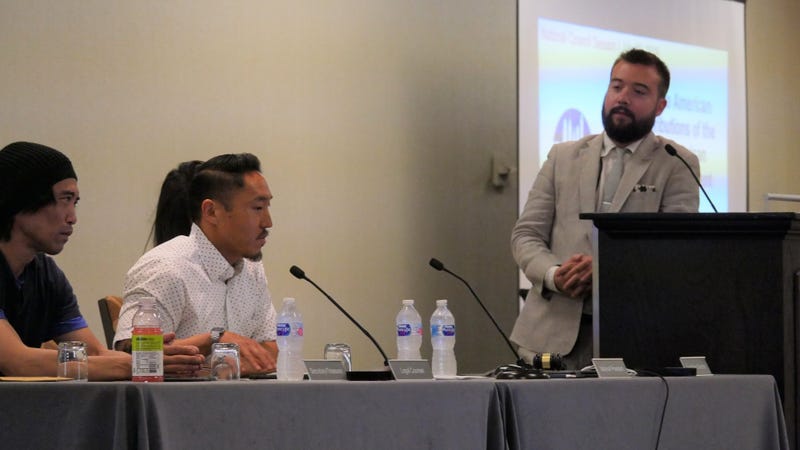
Buscher is deeply involved in working toward positive change in Philadelphia communities. Like Romana Lee-Akiyama, director of the Mayor's Office of Public Engagement, he also works to spark dialogue that leads to better understanding.
His work toward unity is through the arts. Most recently, he brought together performers of Japanese and African American cultures at the Shofuso Cherry Blossom Festival in Fairmount Park.
The program included traditional and multi-ethnic hip-hop performances from groups in and around West Philadelphia.
“Through the work that I'm doing — whether it's with the Asian American Film Festival, or with Japan America society — we're trying to find creative ways of sparking dialogue among different communities. And largely that involves this celebration and exploration of culture, through music, through film, through food, through visual art,” Buscher said.
“Ultimately, people come away from these kinds of programs with the knowledge that we have more in common than that which divides us.”
Buscher encourages everyone to try taiko drumming at the Shofuso Japanese House and Garden, where there are free workshops every Saturday from 1:30 to 4 p.m. through the summer and fall.
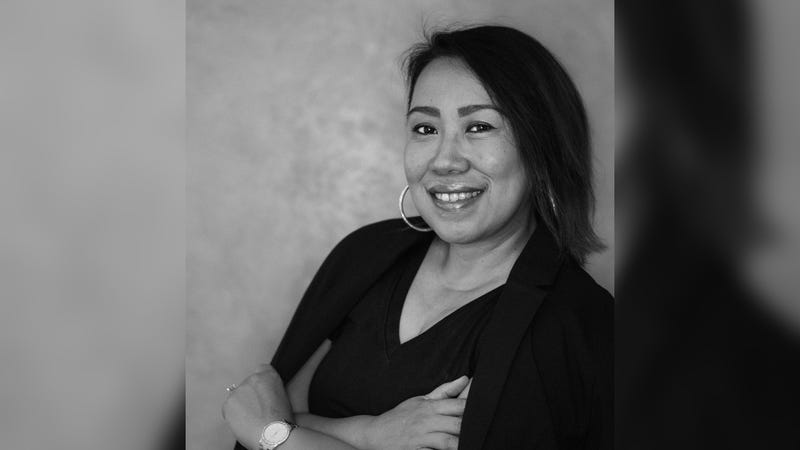
Sinta Penyami Storms — Modero & Company
"Gatong royong"
That phrase, which means “mutual assistance,” is a traditional Indonesian value. It is a mantra that is woven throughout the community.
Sinta Penyami Storms started the nonprofit Modero & Company, a traditional and fusion dance troupe, 10 years ago to educate, inspire youth, and push for social change. She says the company is a torch bearer for Indonesian culture, first and foremost.
"Our mission is really to preserve and promote the traditional Indonesian culture,” Storms said — through dance, food, cultural exchanges — “but also use different aspects of the culture to start conversation, to bring awareness of the community, and help make change for the better community.”
Storms and members of Modero do their part to live the value of gatong royong by helping their community, especially those who struggle with language barriers. They find themselves acting as interpreters, especially for elders whose English is limited. They also take part in outreach efforts to fill in gaps where resources are limited.
“Whenever there's an event, or if there's some sort of information from the city, a lot of the Modero dancers actually would come and help doing some interpretation in the community, whether that's verbally, or we would help translate some documents,” said Storms.
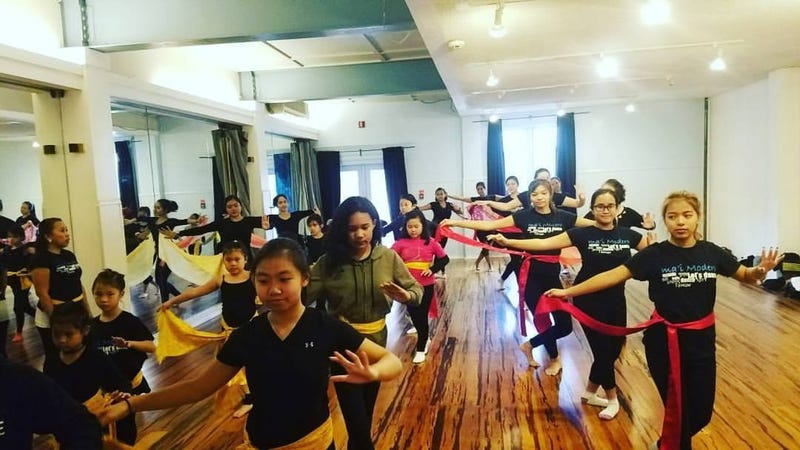
She says Philadelphia is rich in Indonesian culture, with one of the largest concentrations of Indonesian Americans and Indonesian immigrants in the United States. An estimated 5,000 people of Indonesian descent live in South Philadelphia.
"Indonesia has over 300 ethnic groups, and we all look different from the east to the west,” she said.
“What I can tell people is that the Indonesians are super friendly. We have a culture of always welcoming people and we are super supportive of each other.”
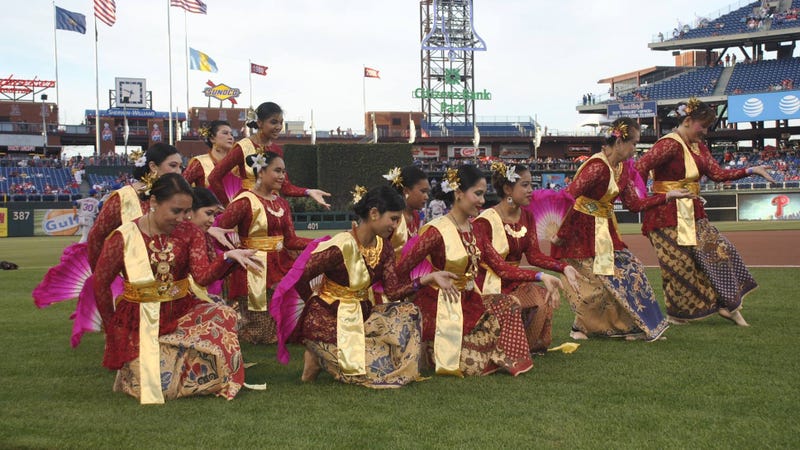
And when the group isn’t supporting that community, they are performing around 100 traditional Indonesian dances throughout the country and internationally each year.
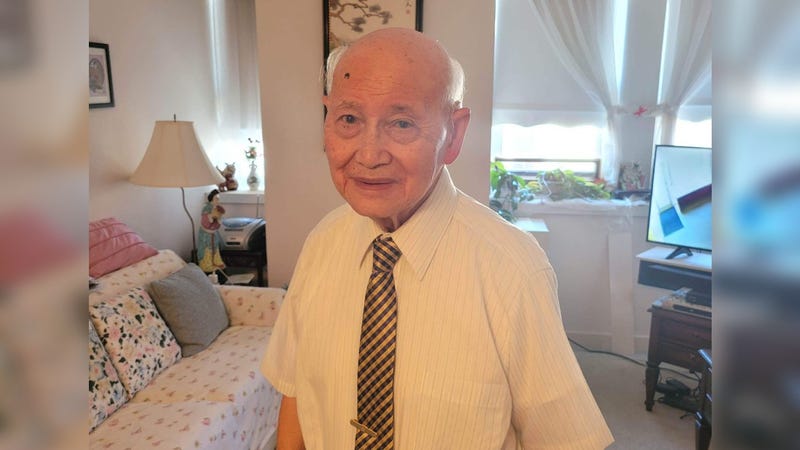
Harry Jung — World War II veteran
Harry Jung powered through adversity and discrimination as a Chinese American growing up during the time of the Chinese Exclusion Act to become a recipient of the Congressional Gold Medal, one of the highest civilian awards bestowed by the Congress.
Recognizing the Chinese Americans who served their country in the war, like Jung, despite institutional discrimination that included limits on how many Chinese people were allowed in the United States, Congress honored thousands of veterans this way — 75 years after World War II ended.
Jung is a second-generation Chinese American, born and raised in North Philadelphia. He now lives in Philadelphia's Chinatown.
Jung, who is now 97 years old, says he remembers enlisting in the U.S. Army when he was barely 18 — his resolve fueled by radio advertisements calling on young men to join the fight against Adolf Hitler.
"As they say, [Hitler was] being a bully, so I decided to enlist to serve my country," Jung said.
He was among 20,000 Chinese Americans — around 20% — who were eager to join the Army in World War II to prove their patriotism.
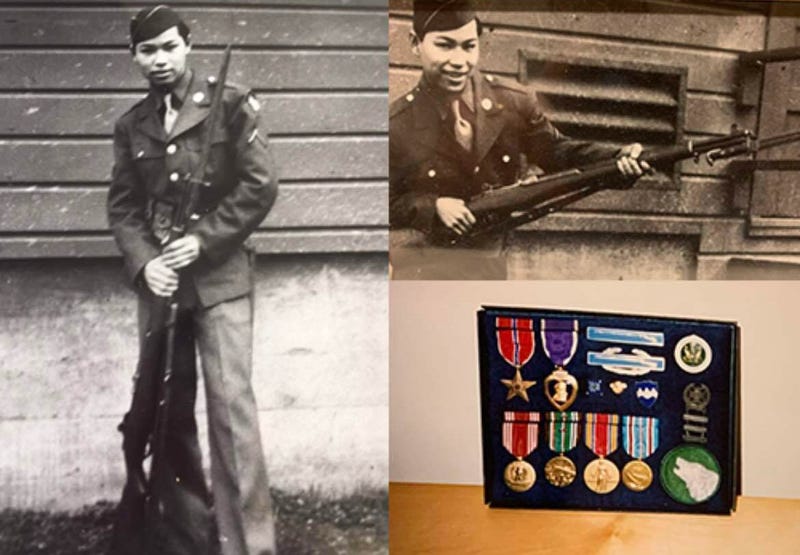
He says he served proudly for two years as a rifleman in the 104th Infantry Division, which was recognized as a liberating unit by the U.S. Army's Center of Military History. Jung said he helped to secure the supply line for Gen. George Patton.
Jung retired from the Army after a German hand grenade injured him, and he returned to Philadelphia and made a home in the Chinatown neighborhood, where he laid down his roots as a distinguished serviceman, a proud Philadelphian, a father and, later, a grandfather.
Jung jokes that he spends his days enjoying his La-Z-Boy recliner. "I feel relaxed,” he said. “Living day by day. Nothing bothers me now.”
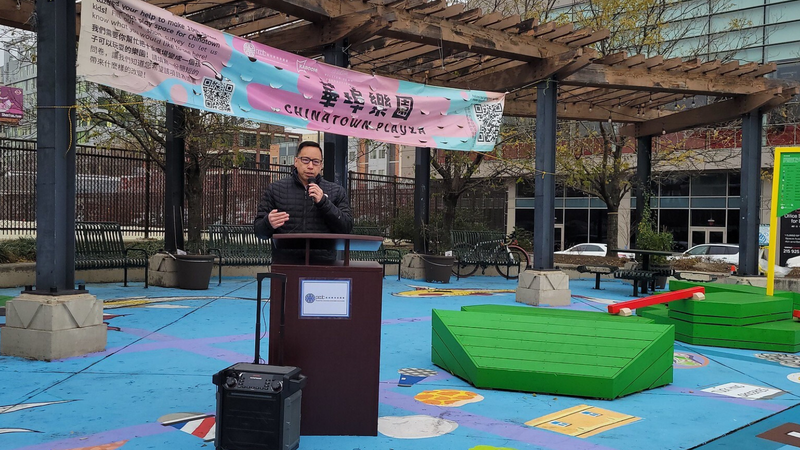
John Chin — Executive Director of Philadelphia Chinatown Development Corporation
John Chin has spent more than 20 years as the executive director of the Philadelphia Chinatown Development Corporation (PCDC), where he has overseen projects and programs that elevate the voices of one of the oldest, best-established Chinatowns in the United States. It’s an undertaking he does not take lightly.
“I love it here,” he said. “I’m committed to Chinatown. I was born and raised in Chinatown.”
He is one of many who has helped nurture the Philadelphia community that made him who he is today. Chinatown has fought back against development that would have cut deeper into its neighborhoods, while simultaneously working to preserve its cultural heritage. The community has also been resilient through the pandemic as it faced anti-Asian attacks and a downturn in business.
Chin views Chinatown as Philadelphia’s neighborhood gem, a cultural hub, and a gateway for many of the city’s newest immigrants.
“Our role at PCDC is to provide this platform for those who don’t have a voice, but especially for immigrants who don’t speak English as their native language. It’s that much more difficult,” he noted.
PCDC realized that one of its greatest strengths is community self-determination, Chin added — the ability of those living in Chinatown to help determine what happens to Chinatown.
“Neighborhoods should be designed and planned by the people, and in the vision of the people,” he said.
Chinatown’s self-determination is evident in the Crane Chinatown Community Center, a recreational and social service hub at 10th and Vine streets. The space, which opened in 2019, celebrates Asian culture. Chin said it took community partnerships, including local government support, to get this project to fruition. He calls it a dream realized.
“When a city feels like it’s acting as one for all people, I think that’s part of this success,” said Chin, who admitted he’s a guy who hates to lose. And so, his fight for the Chinatown community goes on, 22 years and counting. “Just seeing all that Chinatown has to endure, endure all these decades, and see that it’s been so unfair to the people in this community — that’s the motivation to drive on.”
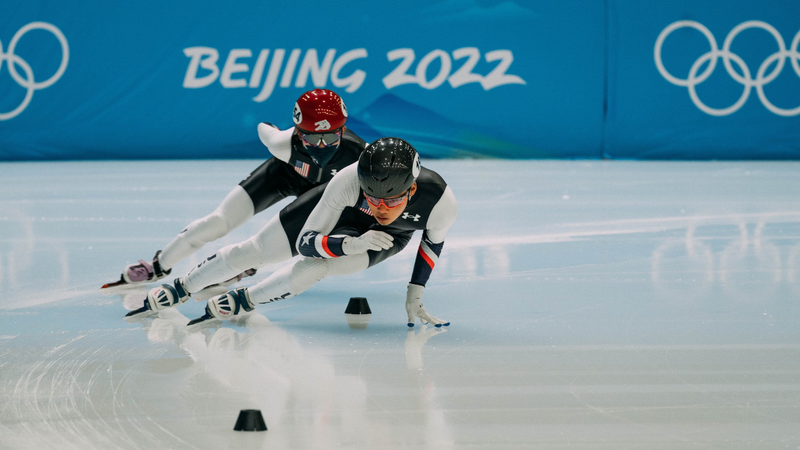
Andrew Heo — Olympian
Andrew Heo of Warrington, Bucks County, became a dominating force on the American men’s short-track speedskating team. It took years of practice and the unending support of his family to get him to the 2022 Winter Games in Beijing.
One of his proudest moments was being able to represent Team USA as an Asian American.
“Internationally, just being able to represent in my Asian background as part of Team USA is definitely a honor, definitely a blessing to be able to … have that opportunity to represent Asian Americans at that level,” said Heo.
His family made major sacrifices to see him and his older brother, Aaron, reach their Olympic dreams. His father ran two auto body shops with his uncle in North Philadephia, sometimes seven days a week. Meanwhile, his mother drove him and his brother to Maryland for practice. They ultimately moved to Salt Lake City, Utah, to train at an Olympic facility.
“This was a family effort,” Heo said. “That is basically what I’m feeling right now and have been feeling ever since I made the team. … We have to go through so much as a family and my parents going through all those sacrifices to let me live out the dream and our dream.”
The 21-year-old is now making an impact on up-and-coming athletes — giving back in the way his family helped him. Aspiring Olympians see themselves in him, and he doesn’t take that lightly.
“These kids would be like, ‘Oh my gosh, are you real?’ It makes me realize how much of an impact I can make on some kids,” he added. “I always say ‘be yourself.’ Don’t compare yourself to others, because especially in skating, you’re your own skater.”
